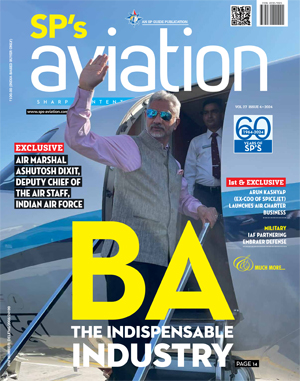INDIAN ARMED FORCES CHIEFS ON
OUR RELENTLESS AND FOCUSED PUBLISHING EFFORTS

SP Guide Publications puts forth a well compiled articulation of issues, pursuits and accomplishments of the Indian Army, over the years

I am confident that SP Guide Publications would continue to inform, inspire and influence.

My compliments to SP Guide Publications for informative and credible reportage on contemporary aerospace issues over the past six decades.
Not Enough!

While it is true that no war can be won without the use of air power, the experience in Libya will only reinforce the lesson that air power alone without boots on the ground is unlikely to win a war, at least not in the conventional spectrum
In the wake of the rebellion in Libya against the regime of Colonel Gaddafi, under authorisation by the UN Security Council for the imposition of a “no fly zone” over the country, France went into action almost immediately ahead of the other members of the hurriedly assembled coalition. British and Canadian jets followed and the US forces initially pounded targets firing over 100 Tomahawk cruise missiles followed up by offensive missions by combat jets. The immediate aim of the aerial offensive was to degrade the capability of the Libyan Government to prevent the coalition from implementing the UN Resolution 1973. While the US, UK and France had pushed for the resolution and were supported in this effort by the Arab League, India, China, Russia, Brazil and Germany abstained. Somewhat surprisingly, neither China nor Russia opted to exercise veto powers, but along with India have subsequently been highly critical of the air strikes over Libya.
The stated objective of the aerial campaign was to protect the lives of innocent civilians from the onslaught by the Libyan Government to crush the rebellion. Aerial action under the UN resolution championed by the US and some allies is understood to have been authorised to safeguard human rights and democratic values; but from the geopolitics of the region, it is abundantly clear that the real battle is for control of oil post-Gaddafi regime.
The UN Resolution clearly stated that no “foreign occupation force” would be permitted on the Libyan soil. As such the US-led coalition has been left with air power as the primary means and as interpreted by them, was authorised to adopt measures such as air or missile strike against airfields, aircraft on the ground, air defence network as also the command, control and communication systems of the Libyan Government. Such actions were considered necessary to prevent the Libyan Air Force aircraft from attacking the civilian population consisting of a mix of military and civilian personnel. Setting aside the legal or ethical aspects of the UN resolution or the debate over the issue of interference into the internal affairs of a nation, it would be pertinent to examine whether air power alone would help achieve the stated as well as unstated objectives in Libya.
It is the forces on the ground that ultimately captures and holds ground. For the successful conduct of operations, therefore, it is necessary that there be proper coordination with the supporting air elements. For better synergy, it is also necessary that the two elements train together. The problem today is that the aim of the mission has not been clearly defined by the coalition. Also, there is lack of cohesion and leadership amongst the rebels that the western powers have been able to identify. As some of the militarily powerful nations of the world are involved, the available air power is perhaps the most potent. However, the ground elements in Libya battling the Gaddafi regime are neither organised nor well equipped and are driven primarily by the rebellious spirit and enthusiasm. Besides, there are signs already of a stalemate on the ground and cracks in the coalition over the issue of leadership role have begun to appear. With the passage of time, opposition to the campaign against the Gaddafi regime may begin to grow especially in the Islamic world. One should not be surprised therefore if the rebels and the coalition forces combine are unable to deliver a knockout blow to the Gaddafi regime quickly enough.





